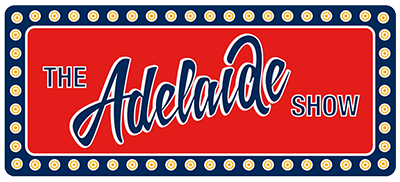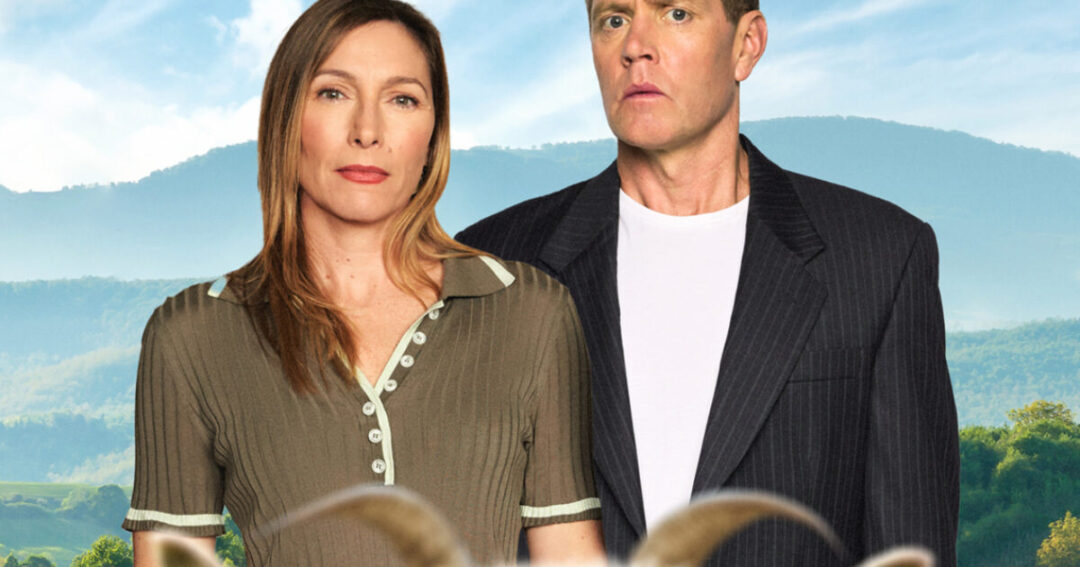“God, I wish you were stupid.”
“I wish you were stupid, too.”
This aching and exasperated exchange between Stevie (Claudia Karvan) and Martin (Nathan Page) is one of those profound moments of reflection and discovery in the midst of tragedy, in Edward Albee’s The Goat Or, Who Is Sylvia?
As Stevie’s world disintegrates around her (literally), while trying to process Martin’s caprine confessions (he is in love with a goat, Sylvia), she fleetingly toys with the notion that the situation would be easier if she could explain his actions away through ignorance or incompetence.
She can’t. She doesn’t want to. And nor would Albee allow his characters to sidestep confrontation through some seedy psychological shuffle.
What he serves, majestically crafted by Mitchell Butel’s best directorial effort to date (IMHO), is a smart, modern take on bedroom farce (barnyard farce, anybody?) where innuendo and slapstick are replaced by transgressive sexual exploration and meticulous, hilarious attention to linguistics.
This glorious play has deeper bandwidth than simple comedy or theatre of cruelty. The themes and incidents explored are done so with sincerity. At the same time, its layered script has its pockets stuffed with both boiled lollies and caviar; the actors treading a fine path (or goat track) between intense “truth” and absurdist vaudevillian sparkle. Yes, metaphors are being mixed here but that’s just how Stevie and Martin like it.
The story unfolds in Martin and Stevie’s home; a large, modern, discerningly decorated living area (a triumph for set designer, Jeremy Allen), with Martin about to be interviewed by his “oldest” friend, Ross (Mark Saturno), to mark his 50th birthday and his significant public accomplishments. After Martin confides in Ross about his love for Sylvia, the seeds are sown for a bitter harvest. Later, as Stevie holds court with Martin, we meet their son, Billy (Yazeed Daher), who is toyed with by his parents during the drama of the moment. Finally, with every minute detail having been candidly shared, there is no outcome possible other than this state of “affairs” requiring some form of sacrifice. Something has to give.
When you see this play, you should belly laugh, you might cringe, but you definitely will be transfixed during 100 minutes of exemplary theatre.
Karvan’s Stevie is like a doll made of wax paper, stiff and crinkly, as she folds herself into various shapes, and gets torn by Martin’s outpourings. Her shock is palpable. We cannot look away. Saturno’s Ross is steadfast and earnest, while Daher’s Billy (what else do you name your kid?) gradually etches his presence amid the whirling dervishes about him.
But the performance that will hold you enthralled will be Page’s Martin. His infuriatingly indescribable presence is at once sharp and hilariously dull, as he seamlessly sways from fun-loving to fierce, to swamped with pathos. Every single moment is believable, even at the excesses of this tragic-farcical ceremony.
That is not to diminish the work of the ensemble, indeed, their pace and their deft passages of silence, sweetened this journey for all of us.
And what a journey. This is a feast of ideas. And the tender cuts are worthy of savouring, especially in this era of social media where “newsfeed perception” is everything. What do we do when love and connection cross unorthodox boundaries? Are we right to explore, or should we kowtow to the opinions of others and fear of them banishing us.
Edward Albee’s The Goat Or, Who Is Slyvia? would have us note that while all love is equal, some love is more equal than others.

